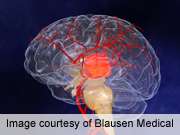Prehospital stroke alerts speed door-to-CT times

(HealthDay)—Emergency medical services (EMS) prenotification regarding the arrival of patients who have had a stroke allows patients to bypass the emergency department and undergo computed tomography (CT) in a timely manner, according to a study published in the March issue of Neurosurgery.
Mandy J. Binning, M.D., from the Capital Institutes for Neurosciences in Trenton and Pennington, N.J., and colleagues examined the door-to-CT and door-to-needle time for 141 prehospital stroke alert patients who bypassed the emergency department.
The researchers found that in 66 percent of cases the EMS prenotification was accurate, and 89 percent of cases had a neurological diagnosis. The average time from patient arrival to CT imaging was 11.8 minutes. Eighteen percent of the patients received intravenous tissue plasminogen activator, with a median of 44 minutes from arrival to tissue plasminogen activator bolus.
"Trained EMS responders are able to correctly identify patients who are experiencing neurological/neurosurgical emergencies and deliver patients to our comprehensive stroke center in a timely fashion after prenotification," the authors write "The prehospital stroke alert protocol bypasses the emergency department, allowing the patient to be met in CT by the neurological emergency department team, which has proven to decrease door-to-CT and door-to-needle times from our historical means."
Two authors disclosed financial ties to the medical device industry.
More information:
Abstract
Full Text (subscription or payment may be required)
Copyright © 2014 HealthDay. All rights reserved.


















